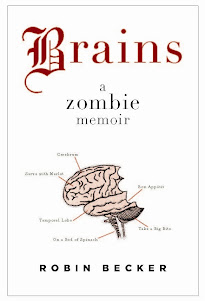If you like what you read--and I know you will--check out his novel Red Planet Noir. Which is set on Mars!
Better Homes and Zombies
by D.B. Grady
Zombies, it seems, are everywhere these days. In film, in comic books, in literature -- even Jane Austen is getting into the act. And so it stands to reason that zombies will soon infiltrate that last bastion of society, the dinner party.
Here, Emily Post guides fail. Indeed, an entire library of literature has yet to be written on the subjects of zombie hospitality, zombie recipes, and zombie etiquette. (Unspeakable works, meanwhile, have been written on their slaughter.) While this essay is not comprehensive, it should be sufficient to get one though a dinner party with an unexpected undead in attendance.
1. Open your doors.
Zombies don't knock, and have a difficult time with doorknobs. This can often lead to full-throated gurgles and groans outside the host's front door, and possible scratching. Some report broken windows.
Can one think of a more embarrassing entrance to a dinner party?
A good host will take care to leave doors, if not fully open (as mosquitoes can be a pest to other party goers), then slightly ajar, allowing zombies to push their way in.
2. Food.
Yes, zombies are cerebrevores, and for many, it is a primal craving, like a well-cooked steak in a dog's food bowl. This is not to compare zombies to animals, understand, but many Undead-Americans, when famished, must eat and will eat.
It is the poor host who does not take this into consideration.
Human brains are difficult to find for purposes gastronomical, and it would be a violation of the author's parole to suggest methods of acquisition. In a bind, however, bovine brain will suffice for all but the most discriminating zombie. (Lamb brain makes a fine snack for the little ones.) Both can be purchased from farmers, meat packing plants, and butcheries.
Deep-fried brain is the easiest of recipes to learn in a pinch. There is little preparation involved, and zombies will appreciate both the flavor and the host's consideration for their dietary habits. The first step involves removing the membrane surrounding the brain, and cut away any blood clots left behind. (This is comparable to the preparation of any cut of meat.) Rinse the brain in cold water. Prepare a batter -- see any fried fish or shrimp recipe for directions -- dip, season and deep-fry. Cooking time: five minutes.
Warning: If creme brulee is served at dessert, be sure to stow the kitchen torch, as zombies fear fire. Leaving one on the table is as as much a social faux pas as offering a wooden toothpick to a vampire.
Helpful hint! Brain can be sliced, battered, seasoned, and fried similar to onion blossoms, as found at Outback Steakhouses. This dish can be served alongside its onion counterpart, so as not to segregate the finger foods of your living and undead guests. Remember, food is social lubricant.
3. Decor.
In many rural areas, weapons are often to be found on display over fireplace mantles. While great-grandfather's 1853 shotgun is a fine conversation piece to most, zombies may well be offended. Shotguns (as well as chainsaws) are responsible for a veritable zombie holocaust. For the duration of the party, it is best to remove all weaponry and lawn care equipment from view. To you, it might be a hedge trimmer. To a zombie, it's a dead sibling.
4. Music.
Easy Listening is generally advised. Do try and avoid music that might lead to dancing, as zombies are not known to be light on their feet. UNDER NO CIRCUMSTANCES SHOULD ROB ZOMBIE BE PLAYED.
5. Drink.
Bloody Marys can be appreciated by both the dead and undead, and are an excellent conversation starter, if only for the name.
While entertaining the reanimated dead will require a reevaluation of one's prejudices and stereotypes, it should be approached with the spirit of kindness, generosity, and understanding. By supping together, opening our homes, and inviting zombies in from the cold, perhaps a new dialogue can be established. A dialogue of giving and receiving. A dialogue of mutual appreciation of the arts and sciences. And a dialogue where one half of the conversation is not, "BRAAIIINSSSS."
--
 D.B. Grady is the author of Red Planet Noir.
D.B. Grady is the author of Red Planet Noir.He can be found on the web at http://www.dbgrady.com.









